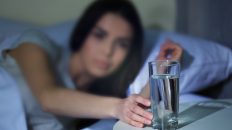By Virginia Gurley, MD, MPH
MB (Marc Braman, MD, MPH):
Hi I’m Doctor Marc Braman, here with Doctor Virginia Gurley, our expert on sleep, and this session’s topic is “Food And Sleep” – what we can do relative to our food to improve our sleep.
Welcome Doctor Gurley.
VG (Virginia Gurley, MD, MPH):
Thank you, Doctor Braman.
MB:
So we talked in earlier sessions about how light during the day affects our sleep and how light at night affects our sleep. What about food? What about our diet? Does our eating affect our sleep?
VG:
Yes, there are a few different ways diet and eating affect our sleep. Most people know caffeine blocks healthy sleep, but what most people don’t know is that both the timing of your meals, and how you spread out the protein and carbohydrates in your meals, greatly affects your sleep.
MB:
So dinner is most people’s main meal of the day. Does it affect sleep?
VG:
Yes, it’s unfortunate dinner is the main meal of the day for most of us, because large dinners not only work again maintaining a healthy body weight, but they also make it harder for the body to shift into restful sleep, especially if your dinner is high in protein and carbohydrates.
MB:
Are you saying it’s better to eat a smaller dinner with less protein and carbohydrates?
VG:
In general, yes, it’s better to eat about two-thirds of your total calories, protein, and carbohydrates at breakfast and lunch. But what may be even more important about dinner is when you eat it. Eating dinner less than 3 hours before bedtime delays your body’s transition into sleep mode and makes it harder to fall asleep.
MB:
And of course an obvious additional benefit would be that people would have less reflux or heart burn. It’s pretty hard to go to sleep when you have a fire in your belly. And that’s largely affected by fat, so maybe that’s how fat also affects sleep.
Okay, so what about breakfast? Why would when and what you eat for breakfast affect your sleep?
VG:
Breakfast seems to affect sleep by controlling your internal alarm clock as well as how quickly and easily you shift from being asleep to being awake.
If you regularly eat a nutritious breakfast within an hour of waking up, your body gets a really clear signal to release the hormone cortisol. And it’s the morning spike in cortisol that helps you wake up and feel alert in the morning.
MB:
So let’s say that I’m one of those people that’s not a big fan of eating breakfast, I skip it most of the time, or I eat just a little bit.
VG:
Skipping breakfast on a regular basis is likely to make waking up in the morning a lot harder, because you’re blocking one of your body’s main and most important processes for shifting from sleep to being awake and alert.
Also, eating at least a third of your daily calories at breakfast is important, because then you can eat a lighter dinner and avoid the sleep delaying effects we talked about a few minutes ago.
MB:
What about lunch? Most people get kind of sleepy after lunch. Does what I eat for lunch cause sleepiness or affect how I sleep at night?
VG:
Lunch doesn’t seem to have much effect on when and how easily you get to sleep at night and wake up in the morning. As far as sleep goes, it seems to be most important for spreading out calories, protein and carbohydrates so you don’t have to eat as much at dinner.
MB:
Excellent, very helpful information. The easiest way for me to think about it, and how I have explained it to my patients for years, is simply to think of their metabolism like a furnace. You put the fuel in when you’re going to need the energy when you’re going to need to burn, and you don’t put it in when you’re going to shut it down and put it into recovery mode. And that seems to make a lot of sense to most people.
So treating the cause, the cause for poor sleep being some of our eating habits, we fix that, we get better sleep.
Doctor Gurley, thank you so much.
VG:
Thank you, Doctor Braman.
Interacting epidemics? Sleep curtailment, insulin resistance, and obesity. Lucassen EA, Rother KI, Cizza G. Annals of the New York Academy of Sciences. 2012;1264(1):110-134. doi:10.1111/j.1749-6632.2012.06655.x.
The impact of sleep deprivation on food desire in the human brain. Greer SM, Goldstein AN, Walker MP. Nature communications. 2013;4:2259. doi:10.1038/ncomms3259.
Alteration of Internal Circadian Phase Relationships after Morning versus Evening Carbohydrate-Rich Meals in Humans. Kurt Kräuchi, Christian Cajochen, Esther Werth, and Anna Wirz-Justice. J Biol Rhythms. August 2002 17: 364-376, doi:10.1177/074873040201700409
Nutrients, Clock Genes, and Chrononutrition. Oike H, Oishi K, Kobori M. Current Nutrition Reports. 2014;3(3):204-212. doi:10.1007/s13668-014-0082-6.
Metabolic Consequences in Humans of Prolonged Sleep Restriction Combined with Circadian Disruption. Buxton OM, Cain SW, O’Connor SP, et al. Science translational medicine. 2012;4(129):129ra43. doi:10.1126/scitranslmed.3003200.
Exposure to Room Light before Bedtime Suppresses Melatonin Onset and Shortens Melatonin Duration in Humans.Gooley JJ, Chamberlain K, Smith KA, et al. The Journal of Clinical Endocrinology and Metabolism. 2011;96(3):E463-E472. doi:10.1210/jc.2010-2098.
Plasma melatonin rhythms in young and older humans during sleep, sleep deprivation, and wake. Zeitzer JM, Duffy JF, Lockley SW, Dijk DJ, Czeisler CA. Sleep. 2007;30(11):1437-1443.
Timing of Sleep and Its Relationship with the Endogenous Melatonin Rhythm. Sletten TL, Vincenzi S, Redman JR, Lockley SW, Rajaratnam SMW. Frontiers in Neurology. 2010;1:137. doi:10.3389/fneur.2010.00137.





